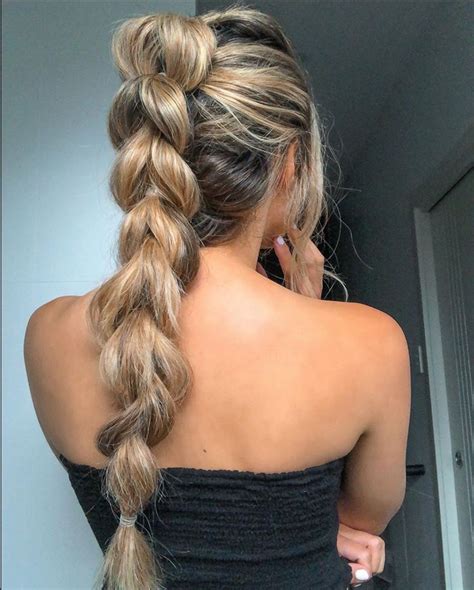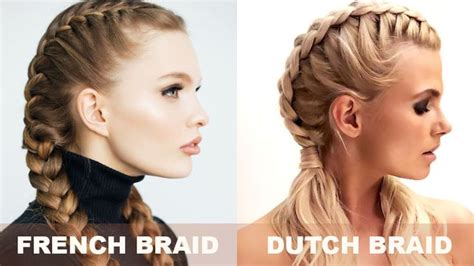Introduction
Braids, an intricate art form passed down through generations, add a touch of elegance to any hairstyle. Among the most popular braiding techniques are Dutch and French braids, both showcasing unique characteristics that set them apart. This comprehensive guide delves into the intricacies of each braid, exploring their differences, advantages, and best applications.

Dutch Braids: An Inside-Out Masterpiece
Definition: Dutch braids, also known as “underhand” braids, are created by crossing the outermost strands beneath the middle strand, resulting in a raised, three-dimensional effect.
Appearance: Dutch braids exhibit a bold and voluminous look, emphasizing texture and intricate detail.
Technique: Starting with a small section of hair, divide it into three strands. Cross the right strand under the middle strand, then cross the left strand under the new middle strand. Repeat this process along the hair length, feeding in additional hair from the sides.
Advantages:
– Creates a voluminous and textured look
– Adds depth and dimension to hairstyles
– Ideal for thick and coarse hair textures
Disadvantages:
– May be more time-consuming to braid
– Can be difficult to maintain tight and secure
French Braids: A Classic Sophistication
Definition: French braids, synonymous with elegance and femininity, are created by crossing the outermost strands over the middle strand, resulting in a flat and sleek appearance.
Appearance: French braids exude a polished and sophisticated vibe, accentuating length and creating a romantic allure.
Technique: Starting with a small section of hair, divide it into three strands. Cross the left strand over the middle strand, then cross the right strand over the new middle strand. Continue this process, gradually incorporating hair from the sides.
Advantages:
– Creates a sleek and polished look
– Ideal for long and fine hair textures
– Relatively quick and easy to braid
Disadvantages:
– May lack volume and dimension
– Can be difficult to hold securely in thicker hair
Head-to-Head Comparison: Dutch vs French Braids
| Feature | Dutch Braids | French Braids |
|---|---|---|
| Appearance | Voluminous, textured | Sleek, polished |
| Technique | Cross strands under | Cross strands over |
| Time to Braid | More time-consuming | Relatively quick |
| Hair Texture | Ideal for thick and coarse | Ideal for long and fine |
| Applications | Creating volume, fullness | Adding length, sophistication |
Applications for Dutch and French Braids
Dutch Braids:
– Voluminous updos and chignons
– Statement braids for parties and events
– Side-braided styles for a touch of drama
French Braids:
– Long, elegant ponytails and braids
– Braided headbands for a bohemian vibe
– Intricate updos for special occasions
Strategies for Perfecting Your Braiding Technique
- Use a fine-toothed comb to detangle hair before braiding for a smooth finish.
- Section hair into smaller strands for greater control and precision.
- Keep your tension even throughout the braid to maintain its shape.
- Practice regularly to master the techniques and improve your speed.
- Experiment with different braiding patterns and accessories to create unique styles.
Avoiding Common Braiding Mistakes
- Braiding too tightly can cause hair breakage and discomfort.
- Adding too much hair from the sides can create an unruly and messy look.
- Ignoring the ends of the braid can result in fraying and tangles.
- Using dull or damaged hair tools can snag and damage hair.
- Overworking the braids can lead to a frizzy and flattened appearance.
Conclusion
Whether you prefer the voluminous beauty of Dutch braids or the sleek sophistication of French braids, both techniques offer endless possibilities for hair transformation. By understanding their distinct characteristics and applications, you can create stunning hairstyles that complement your individual style. Embrace the art of braiding and elevate your hair game to new heights.
